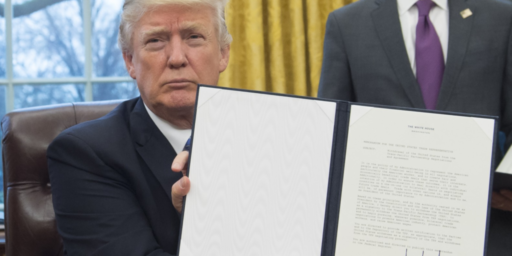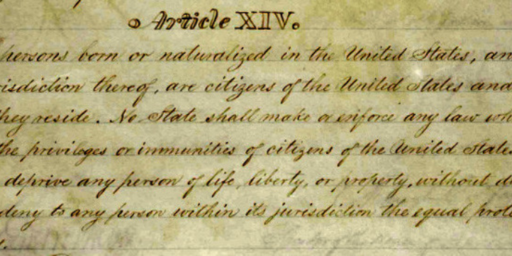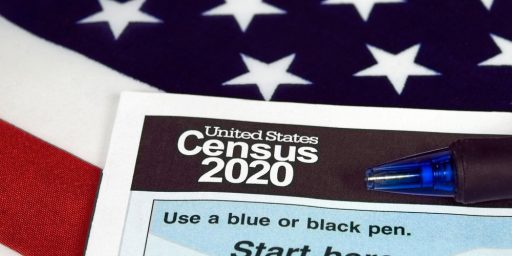SCOTUS Declines to Declare American Samoans Citizens
The court, rightly, punted the issue to Congress and local leaders.

AP (“Court rejects appeal to give American Samoans citizenship“):
The Supreme Court on Monday rejected an appeal seeking to give people born in American Samoa U.S. citizenship.
In leaving in place an appeals court decision, the court also passed up an invitation to overturn a series of decisions dating back to 1901 known as the Insular Cases, replete with racist and anti-foreign rhetoric. Justice Neil Gorsuch had called for the cases to be overturned in April.
But the justices refused to take up an appeal from people born in American Samoa, and living in Utah, who argued that a federal law declaring that they are “nationals, but not citizens, of the United States at birth” is unconstitutional.
A trial judge in Utah ruled in their favor, but the federal appeals court in Denver said Congress, not courts, should decide the citizenship issue. The appeals court also noted that American Samoa’s elected leaders opposed the lawsuit for fear that it might disrupt their cultural traditions.
“It’s a punch in the gut for the Justices to leave in place a ruling that says I am not equal to other Americans simply because I was born in a U.S. territory,” John Fitisemanu, the lead plaintiff, said in a statement. “I was born on U.S. soil, have a U.S. passport and pay my taxes like everyone else. But because of a discriminatory federal law, I am not recognized as a U.S. citizen.”
American Samoa is the only unincorporated territory of the United States where the inhabitants are not American citizens at birth.
Instead, those born in the cluster of islands some 2,600 miles (4,184 kilometers) southwest of Hawaii are granted “U.S. national” status, meaning they can’t vote for U.S. president, run for office outside American Samoa or apply for certain jobs. The only federal election they can cast a vote in is the race for American Samoa’s nonvoting U.S. House seat.
Not taking up the case “helps preserve American Samoa’s cultural priorities and right of self-determination,” said Amata Coleman Radewagen, American Samoa’s U.S. House delegate.
“Our people value American Samoa’s right of self-determination, with great love for the United States as expressed in our people’s high rate of service to the country,” she said in a statement. “The issue of the Insular Cases can be addressed by Congress, based on self-determination by the people of each territory.”
The Insular Cases, which arose following the Spanish-American War, dealt with the administration of overseas territories.
In their conclusion that residents of territories had some, but not all, rights under the Constitution, justices wrote in stark racial and xenophobic terms. Citizenship could not be automatically given to “those absolutely unfit to receive it,” one justice wrote.
That history prompted Gorsuch to comment in a case involving benefits denied to people who live in Puerto Rico, decided in April. He wrote that the Insular Cases were wrongly decided because they deprived residents of U.S. territories of some constitutional rights.
“It is past time to acknowledge the gravity of this error and admit what we know to be true: The Insular Cases have no foundation in the Constitution and rest instead on racial stereotypes. They have no place in our law,” Gorsuch wrote.
The case stems from a lawsuit filed by three American Samoa natives now living in Utah, where they are prohibited from voting or becoming police officers.
The Biden administration joined the American Samoa government in calling for the court to reject the appeal. Solicitor General Elizabeth Prelogar, the administration’s top Supreme Court lawyer, wrote that “the government in no way relies on the indefensible and discredited aspects of the Insular Cases’ reasoning and rhetoric” that was highlighted in the appeal.
It should not shock anyone that Supreme Court cases dating from 1901 invoke racist attitudes towards natives of non-white colonial possessions of the United States. Obviously, attitudes towards both race and colonialism have changed considerably in the interim. That they contain racist language, though, really doesn’t tell us anything about their validity.
Section 1 of the 14th Amendment states, “All persons born or naturalized in the United States, and subject to the jurisdiction thereof, are citizens of the United States and of the state wherein they reside.” The territories are not in the United States, so it stands to reason those born there are not automatically citizens.*
In all cases save American Samoa, however, Congress has seen fit to declare residents American citizens and extend birthright citizenship. I agree with the trial court judge (Clark Waddoups, a George W. Bush appointee) and with the ACLU that it ought do the same for American Samoa, presuming the residents want it.
Apparently, that’s the rub here. Another AP report from last June (“American Samoa culture plays role in US citizenship ruling“) sheds light on the circuit court decision that overturned Waddoups.
The ruling notes that American Samoa government leaders and others opposed the lawsuit because they are concerned automatic citizenship could disrupt cultural traditions, such as communal land ownership and social structures organized around large, extended families led by matai, those with hereditary chieftain titles.
“There is simply insufficient caselaw to conclude with certainty that citizenship will have no effect on the legal status of the fa’a Samoa,” or the American Samoan way of life, the ruling said. “The constitutional issues that would arise in the context of America Samoa’s unique culture and social structure would be unusual, if not entirely novel, and therefore unpredictable.”
Drawing on the views of the American Samoa people is one of the more gratifying aspects of the ruling, said Michael Williams, an attorney representing the American Samoa government, which intervened to oppose the lawsuit.
“It is also vindication for the principle that the people of American Samoa should determine their own status in accordance with Samoan culture and traditions,” he said.
A path toward U.S. citizenship exists for those who want it. But some say it’s costly and cumbersome. Non-citizen nationals of American Samoa are entitled to work and travel freely in the United States and receive certain advantages in the naturalization process.
[…]
Self-determination is a highly valued principle in American Samoa, said Line-Noue Memea Kruse, adjunct faculty in Pacific islands studies at Brigham Young University-Hawaii and whose book is cited in the ruling.
“There are many foreign interests looming over these citizenship cases,” she said. “This is not the end. They will keep pushing. This to me is a form of inter-territorial hegemony.”
I haven’t studied the issue enough to have a strong opinion of it. I’d be perfectly fine with a hybrid system, such as Puerto Rico’s, where they’re born citizens and enjoy all the rights and responsibilities of citizenship on the mainland but have autonomy in the territory. But it seems perfectly reasonable for the territorial government to work that out with Congress rather than having it decided by the courts.
____________
*A dissenting opinion in the 10th Circuit by Judge Robert E. Bacharach states that, “When the Fourteenth Amendment was ratified, courts, dictionaries, maps, and censuses uniformly regarded territories as land ‘in the United States.'” While I’m sure that’s true, “territories” in those days were contiguous and settled by Americans. We didn’t start acquiring overseas territories until after the Spanish-American War.






Are there not foreign constitutional courts which have the option of deciding an individual case per existing law but making a formal referral to the legislature for change?
Wasn’t Alaska, a non-contiguous territory obtained in 1867, the year before the 14th amendment was ratified?